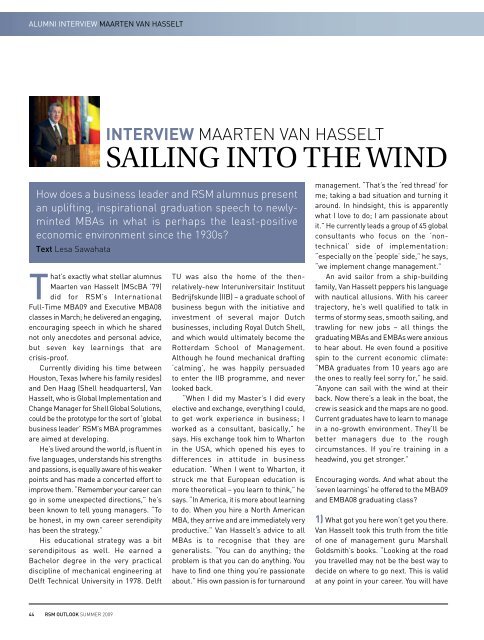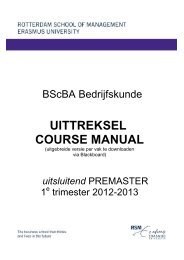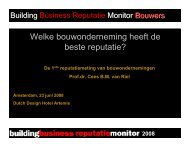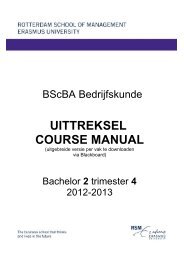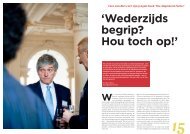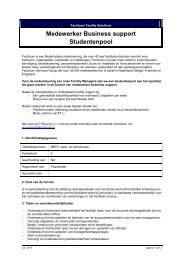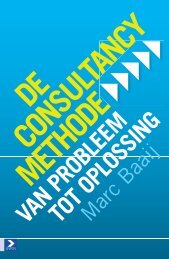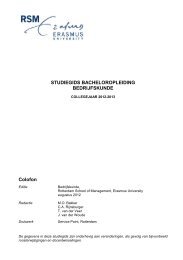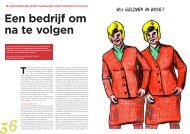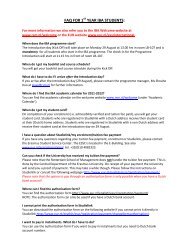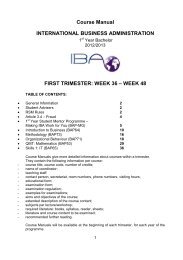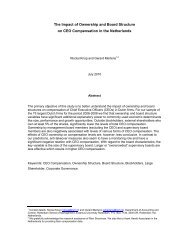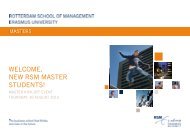here - Rotterdam School of Management
here - Rotterdam School of Management
here - Rotterdam School of Management
You also want an ePaper? Increase the reach of your titles
YUMPU automatically turns print PDFs into web optimized ePapers that Google loves.
ALUMNI INTERVIEW MAARTEN VAN HASSELT<br />
That’s exactly what stellar alumnus<br />
Maarten van Hasselt (MScBA ’79)<br />
did for RSM’s International<br />
Full-Time MBA09 and Executive MBA08<br />
classes in March; he delivered an engaging,<br />
encouraging speech in which he shared<br />
not only anecdotes and personal advice,<br />
but seven key learnings that are<br />
crisis-pro<strong>of</strong>.<br />
Currently dividing his time between<br />
Houston, Texas (w<strong>here</strong> his family resides)<br />
and Den Haag (Shell headquarters), Van<br />
Hasselt, who is Global Implementation and<br />
Change Manager for Shell Global Solutions,<br />
could be the prototype for the sort <strong>of</strong> ‘global<br />
business leader’ RSM’s MBA programmes<br />
are aimed at developing.<br />
He’s lived around the world, is fluent in<br />
five languages, understands his strengths<br />
and passions, is equally aware <strong>of</strong> his weaker<br />
points and has made a concerted effort to<br />
improve them. “Remember your career can<br />
go in some unexpected directions,” he’s<br />
been known to tell young managers. “To<br />
be honest, in my own career serendipity<br />
has been the strategy.”<br />
His educational strategy was a bit<br />
serendipitous as well. He earned a<br />
Bachelor degree in the very practical<br />
discipline <strong>of</strong> mechanical engineering at<br />
Delft Technical University in 1978. Delft<br />
44 RSM OUTLOOK SUMMER 2009<br />
interview MAARTEN VAN HASSELT<br />
SAILING INTO THE WIND<br />
How does a business leader and RSM alumnus present<br />
an uplifting, inspirational graduation speech to newlyminted<br />
MBAs in what is perhaps the least-positive<br />
economic environment since the 1930s?<br />
Text Lesa Sawahata<br />
TU was also the home <strong>of</strong> the thenrelatively-new<br />
Interuniversitair Instituut<br />
Bedrijfskunde (IIB) – a graduate school <strong>of</strong><br />
business begun with the initiative and<br />
investment <strong>of</strong> several major Dutch<br />
businesses, including Royal Dutch Shell,<br />
and which would ultimately become the<br />
<strong>Rotterdam</strong> <strong>School</strong> <strong>of</strong> <strong>Management</strong>.<br />
Although he found mechanical drafting<br />
‘calming’, he was happily persuaded<br />
to enter the IIB programme, and never<br />
looked back.<br />
“When I did my Master’s I did every<br />
elective and exchange, everything I could,<br />
to get work experience in business; I<br />
worked as a consultant, basically,” he<br />
says. His exchange took him to Wharton<br />
in the USA, which opened his eyes to<br />
differences in attitude in business<br />
education. “When I went to Wharton, it<br />
struck me that European education is<br />
more theoretical – you learn to think,” he<br />
says. “In America, it is more about learning<br />
to do. When you hire a North American<br />
MBA, they arrive and are immediately very<br />
productive.” Van Hasselt’s advice to all<br />
MBAs is to recognise that they are<br />
generalists. “You can do anything; the<br />
problem is that you can do anything. You<br />
have to find one thing you’re passionate<br />
about.” His own passion is for turnaround<br />
management. “That’s the ‘red thread’ for<br />
me; taking a bad situation and turning it<br />
around. In hindsight, this is apparently<br />
what I love to do; I am passionate about<br />
it.” He currently leads a group <strong>of</strong> 45 global<br />
consultants who focus on the ‘nontechnical’<br />
side <strong>of</strong> implementation:<br />
“especially on the ‘people’ side,” he says,<br />
“we implement change management.”<br />
An avid sailor from a ship-building<br />
family, Van Hasselt peppers his language<br />
with nautical allusions. With his career<br />
trajectory, he’s well qualified to talk in<br />
terms <strong>of</strong> stormy seas, smooth sailing, and<br />
trawling for new jobs – all things the<br />
graduating MBAs and EMBAs were anxious<br />
to hear about. He even found a positive<br />
spin to the current economic climate:<br />
“MBA graduates from 10 years ago are<br />
the ones to really feel sorry for,” he said.<br />
“Anyone can sail with the wind at their<br />
back. Now t<strong>here</strong>’s a leak in the boat, the<br />
crew is seasick and the maps are no good.<br />
Current graduates have to learn to manage<br />
in a no-growth environment. They’ll be<br />
better managers due to the rough<br />
circumstances. If you’re training in a<br />
headwind, you get stronger.”<br />
Encouraging words. And what about the<br />
‘seven learnings’ he <strong>of</strong>fered to the MBA09<br />
and EMBA08 graduating class?<br />
1) What got you <strong>here</strong> won’t get you t<strong>here</strong>.<br />
Van Hasselt took this truth from the title<br />
<strong>of</strong> one <strong>of</strong> management guru Marshall<br />
Goldsmith’s books. “Looking at the road<br />
you travelled may not be the best way to<br />
decide on w<strong>here</strong> to go next. This is valid<br />
at any point in your career. You will have


